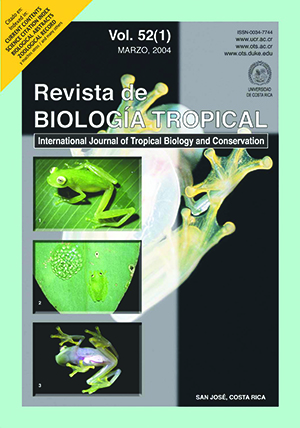Abstract
Infection and multiplication of Leishmania infantum and L. mexicana inside of skin fibroblasts from hamsters, mice and rats was achieved. This process was demonstrated either by counting parasites inside the stained cells or by electronic microscopy studies. In addition multiplication rate differences in the cells from these rodent species were determined, for L. infantum as well as for L. mexicana. Parasite development in hamsters and mice fibroblasts was evident but there was not multiplication in rat cells showing that apparently they are refractory to Leishmania infection. These results suggest that the parasite affinity for each animal, as well as any intracellular environment resistance, could involve genetic factors in the parasite multiplication. On the other hand, presence of amastigote multiplication inside of parasitophorus vacuole, showed by electronic microscopy images, probes a true parasite transformation. Therefore it is suggested that fibroblasts could work as host cells for parasite survival and permanency in the infected animals.References
Alvar, J., C. Cañavate, B. Gutierrez–Solar, M. Jiménez, F. Laguna, R. López-Velez, R. Molina & J. Moreno. 1997. Leishmania and Human Immunodeficiency Virus coinfection: the first ten years. Clin. Microbiol. Rev. 10: 298-319.
Bastardo, T., L. Arcay & F. Tejero. 1983. Interaction of avirulent Leishmania spp with rat peritoneal macrophages.
Mem. Inst. Oswaldo Cruz. 78: 21-26.
Bogdan, C., N. Donhauser, R. Doring, M. Rollinghoff, A. Diefenbach & M.G. Rittig. 2000. Fibroblasts as host
cells in latent leishmaniosis. J. Exp. Med. 191: 2121- 2130.
Carrillo, J., M.Chinchilla, B. Valverde, O. Porras & L. Mora. 1999. Visceral Leishmaniasis in Costa Rica: First Case Report. Clin. Infect. Dis. 29: 678-679.
Chang, K.P. 1978. Leishmania infection of human skin fibroblasts in vitro: absence of phagolysosomal fusion after induced phagocytosis of promastigotes, and their intracellular transformation. Am. J. Trop. Med. Hyg. 27: 1084-1096.
Chinchilla, M., M. Alfaro & O.M. Guerrero. 1981. Adaptación natural de la rata blanca a Toxoplasma gondii.
Rev. Biol. Trop. 29: 273-282.
Chinchilla, M. & J. Frenkel. 1984. Resistencia a la infección por Toxoplasma in vitro inducida por mediadores linfocitarios en células no fagocíticas de ratón y hámster. Inmunología. 3: 144-150.
Chinchilla, M., L. Reyes & O. Guerrero. 1995. Resistance to intracellular parasites correlates with species differences
in ability of macrophages to inhibit parasite replication. Immunol. Infect. Dis. 5: 83-87.
Chinchilla, M., O.M. Guerrero, L. Reyes & E. Abrahams. 1996. Susceptibilidad de la rata Sigmodon hispidus (Rodentia: Cricetidae) al Toxoplasma gondii (Eucoccidia: Sarcocystidae). Rev. Biol. Trop. 44: 265-268.
Corte-Real, S., C.B. Santos & M.N. Meirelles. 1995. Differential expression of the plasma membrane Mg2
+ ATPase and Ca2 +ATPase activity during adhesion and interiorization of Leishmania amazonensis in fibroblasts in vitro. J. Submicrosc. Cytol. Pathol. 27: 359-366.
Grimaldi, G. & R. Tesh. 1993. Leishmaniasis of the new world: current concepts and implications for future research. Clin. Microbiol. Rev. 6: 230-250.
Guerbouj, S., I.Gizani, K. Victoir D. Le Ray & J.C. Dujardin. 2000. Parasite candidate vaccines: a warning
from polimorphic Leishmania populations. Parasitol. Today. 16: 265.
Guerrero, O., M. Chinchilla & E. Abrahams. 1997. Increasing of Toxoplasma gondii (Coccidia, Sarcocystidae)
infections by Trypanosoma lewisi (Kinetoplastida, Trypanosomatidae) in white rats. Rev. Biol. Trop. 45: 887-882.
Hernández, F. & R. Guillén. 2000. Microwave processing for scanning electron microscopy. Eur. J. Morphol. 38: 109-111.
Hervás-Rodríguez, J., E. Mozos, A. Méndez, J. Pérez & J.C. Gómez-Villamandos. 1996. Leishmania infection
of canine skin fibroblasts in vivo. Vet. Pathol. 33: 469-473.
Howood, D., G. Milne & J. Penston. 1990. A comparison of microwaves and heat alone in the preparation of tissue for electron microscopy. Histochem. J. 22: 358-364.
Mauel, J. 1990. Macrophage-parasite interactions in Leishmania infections. J. Leukoc. Biol. 47: 187-193.
Medrano, F., C. Cañavate, M. Leal, C. Rey, E. Lissen & J. Alvar. 1998. The role of serology in the diagnosis and prognosis of VL in patients infected with HIV type 1. Am. J. Trop. Med. Hyg. 59: 155-162.
Méndez, S., M. Nell & J. Allunda. 1996. Leishmania infantum: infection of macrophages in vitro with promastigotes.
Internat. J. Parasitol. 26: 619- 622.
Molina, S. & M. Chinchilla. 1996. Multiplicación in vitro de Leishmania mexicana en macrófagos de hámster
y ratones infectados y no infectados. Parasitol. Al Día. 20: 79-85.
Pearson, R. & A. Queiroz-Souza. 1996. Clinical spectrum of leishmaniasis. Clin. Infect. Dis. 22: 1-13.
Schwartzman, J. & R. Pearson. 1985. The interaction of Leishmania donovani promastigotes and human fibroblasts in vitro. Am. J. Trop. Med. Hyg. 34: 850-855.
Segal, G., W. Lee, P. Arora, M. McKee, G. Downey & C.A. McBulloch. 2001. Involvement of actin filaments and integrins in collagen phagocytosis by human fibroblasts. J. Cell.Sci. 114: 119-129.
Troyo, A. & M. Chinchilla. 2003. In vitro multiplication of Toxoplasma gondii and Trypanosoma cruzi in mouse,
rat, and hamster astrocytes. Rev. Biol. Trop. 51: 639-646.
Wang, R., A. Ghahary, Y. Shen, P.G. Scott & E.E. Tredget. 1996. Human dermal fibroblasts produce NO and express
both cNOS and iNOS isoforms. J. Invest. Dermatol. 106: 419-427.
Wolday, D., N. Berhe, H. Akuffo et al. 1999. Leishmania- –HIV intercation: immunopathogenic mechanisms. Parasitol. Today. 15: 182-187.
##plugins.facebook.comentarios##

This work is licensed under a Creative Commons Attribution 4.0 International License.
Copyright (c) 2004 Revista de Biología Tropical


